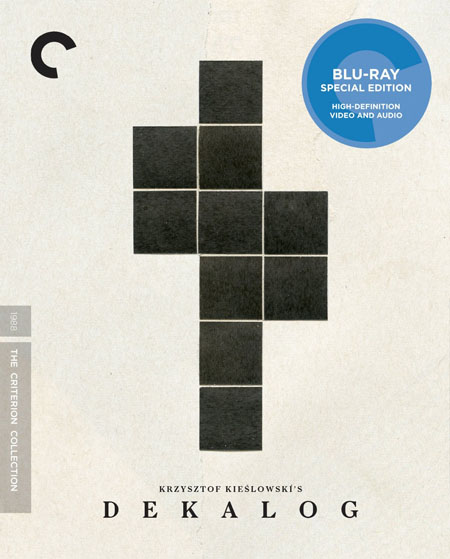
“SOME SHORT FILMS
ABOUT COMMANDMENTSâ€
By Raymond Benson
Much
has been written and said about director Krzysztof Kieślowski’s
ten-hour mini-series originally broadcast on Polish television in 1988. The
late Stanley Kubrick, who rarely commented on other filmmakers’ works, wrote in
a foreword to the published screenplays of Dekalog
that Kieślowski and his co-writer Krzysztof Piesiewicz
had dramatized their ideas with “dazzling skill.†Many critics have called Dekalog one of the greatest television
mini-series ever made.
Although
Dekalog has been previously released
on home video, The Criterion Collection has seen fit to present on DVD and
Blu-ray a new, restored 4K digital transfer that has also been recently playing
in select art house cinemas around the U.S. Even though all but two episodes
are in an analog television aspect ratio (4:3), there is no question that this
is cinematic material. Kieślowski’s mise-en-scene is subtle and beckons to
be seen on the big screen—or a large high definition TV. The clarity of the new
Criterion release does wonders for Dekalog,
and as a result the package is one of the hallmarks of the company’s
prestigious releases.
Dekalog is loosely based on
the Ten Commandments. No, it’s not a Biblical drama. Each episode is a modern (i.e.,
the late 1980s, when the films were made) take on how the Ten Commandments
relate—or not—to the contemporary world. The stories are set in and around a
single apartment block in Warsaw, Poland, and mostly involve various tenants.
Each episode is a separate tale, and yet characters from one part might appear
in the background of another, illustrating that the “chapters†are connected.
For example, a little girl who is at the focus of Dekalog: Seven can be seen playing outside a window in Dekalog: Nine. An old man who collects
stamps is a minor character in Dekalog:
Eight, and his two grown sons are the protagonists of Dekalog: Ten.
Kieślowski,
who died too young (of heart failure) in 1996, apparently liked story cycles.
Another of his acclaimed works is the Three
Colors Trilogy (Blue; White; Red) from 1993 and 1994—interconnected but
separate tales obliquely meditating on the meanings behind the colors of the
French flag. Dekalog does the same
thing with the Ten Commandments. Kieślowski and Piesiewicz
wrote ten little dramas that have as starting points the Biblical moral tenets,
but they are not handled literally. For example, in Dekalog: One, a man keeps his beloved computer in a prominent spot
in his living room, but his reliance on what the computer tells him with its
calculations eventually has tragic results. This is Kieślowski’s
ironic way of commenting on the
commandment “thou shalt have no other gods before me.â€
And
that’s the key to Dekalog—every
episode is flush with irony. The episode dealing with “thou shalt not kill†is
more about the capital punishment faced by the protagonist of the tale than it
is the murder he committed that landed him on death row. The episode concerning
“honor thy parents†concerns a young woman who has incestuous thoughts for the
man she always thought was her father—but who, it turns out, is not. Sometimes
a single episode relates to two—or even three—commandments, and there are cases
in which one commandment is the subject of two or more chapters.
This
is provocative, challenging stuff.
Dekalog stars some of the
most talented Polish actors of the day—many of whom none of us outside the Iron
Curtain knew at the time. And that’s another thing—one must keep in mind that Dekalog was made while Poland was still
a Communist country. While this has some bearing on the stories, the underlying
truths of the piece are still quite universal.
Interestingly,
the cycle features nine different cinematographers (Three and Nine were shot
by the same DP). There is indeed a different look to each episode—and yet Kieślowski
managed to keep them all consistent in style to create a whole. The cumulative
effect of the ten pieces—in content and visual craft—is what ultimately makes Dekalog such a powerful, meaningful work
of art.
Two
of the episodes, Five and Six, were expanded to feature length
(and were shot in widescreen) to become A
Short Film About Killing and A Short
Film About Love, and were released theatrically, also in 1988. The longer
pictures add more depth to the original TV versions. In the case of A Short Film About Love, the ending is
remarkably different. Fortunately, Criterion has included these two feature
films in the set along with the ten original one-hour episodes and trailers.
An
entire extra disk is devoted to hours of supplements. Most welcome are archival
interviews with Kieślowski, taken from 1987, 1990, and 1995. A
very informative and illustrative new interview with film studies professor and
author Annette Insdorf is a highlight of the set. Other archival and new
material includes interviews with thirteen cast members, Piesiewicz, three
cinematographers, editor Ewa Smal, and Kieślowski confidante
Hanna Krall. The thick booklet contains an essay and capsules on the films by
cinema scholar Paul Coates, along with excerpts from the book Kieślowski
on Kieślowski.
The
Criterion Collection has always been known for producing boxed sets of
outstanding quality. Dekalog is one
of their crown jewels.
CLICK HERE TO ORDER FROM AMAZON